FGF7/KGF regulates autophagy in keratinocytes: A novel dual role in the induction of both assembly and turnover of autophagosomes
- PMID: 24577098
- PMCID: PMC5119059
- DOI: 10.4161/auto.28145
FGF7/KGF regulates autophagy in keratinocytes: A novel dual role in the induction of both assembly and turnover of autophagosomes
Abstract
Autophagy is a degradative pathway through which cells overcome stressful conditions and rapidly change their phenotype during differentiation. Despite its protective role, when exacerbated, autophagy may lead to cell death. Several growth factors involved in cell survival and in preventing differentiation are able to inhibit autophagy. Here we investigated the autophagic role of FGF7/KGF, an important player in epithelial cell protection and differentiation. Biochemical and quantitative fluorescence approaches showed that FGF7 and its signaling induce autophagy in human keratinocytes and the use of specific inhibitors indicated that this effect is independent of the PI3K-AKT-MTOR pathway. The selective block of autophagosome-to-lysosome fusion clarified that FGF7 induces autophagy stimulating autophagosome formation. However, quantitative fluorescence approaches also indicated that, upon a prolonged autophagic stimulus, FGF7 is able to accelerate autophagosome turnover. Moreover, in differentiating keratinocytes, the use of the autophagic inhibitor 3-MA as well as the depletion of BECN1 and ATG5, 2 essential regulators of the process, counteracted the FGF7-induced increase of the differentiation marker KRT1/K1, suggesting that autophagy is required for the FGF7-mediated early differentiation. These results provide the first evidence of a role of FGF7 in the regulation of sequential steps of the autophagic process and strengthen the hypothesis of a direct interplay between autophagy and differentiation. On the other hand, the ability of FGF7 to accelerate autophagosome turnover, preventing their dangerous accumulation, is consistent with the well-established protective role played by the growth factor in epithelial cells.
Keywords: FGF7; FGFR2b; KGF; KGFR; autophagy.
Figures


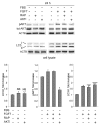


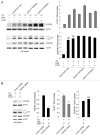
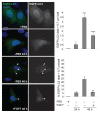

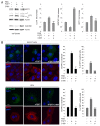
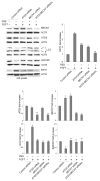

References
-
- Ravikumar B, Sarkar S, Davies JE, Futter M, Garcia-Arencibia M, Green-Thompson ZW, Jimenez-Sanchez M, Korolchuk VI, Lichtenberg M, Luo S, et al. . . Regulation of mammalian autophagy in physiology and pathophysiology. Physiol Rev 2010; 90:1383 - 435; http://dx.doi.org/10.1152/physrev.00030.2009; PMID: 20959619 - DOI - PubMed
-
- Rubinsztein DC, Mariño G, Kroemer G. . Autophagy and aging. Cell 2011; 146:682 - 95; http://dx.doi.org/10.1016/j.cell.2011.07.030; PMID: 21884931 - DOI - PubMed
-
- Cecconi F, Levine B. . The role of autophagy in mammalian development: cell makeover rather than cell death. Dev Cell 2008; 15:344 - 57; http://dx.doi.org/10.1016/j.devcel.2008.08.012; PMID: 18804433 - DOI - PMC - PubMed
-
- Yang Z, Klionsky DJ. . Mammalian autophagy: core molecular machinery and signaling regulation. Curr Opin Cell Biol 2010; 22:124 - 31; http://dx.doi.org/10.1016/j.ceb.2009.11.014; PMID: 20034776 - DOI - PMC - PubMed
-
- Maiuri MC, Zalckvar E, Kimchi A, Kroemer G. . Self-eating and self-killing: crosstalk between autophagy and apoptosis. Nat Rev Mol Cell Biol 2007; 8:741 - 52; http://dx.doi.org/10.1038/nrm2239; PMID: 17717517 - DOI - PubMed
Publication types
MeSH terms
Substances
LinkOut - more resources
Full Text Sources
Other Literature Sources
Miscellaneous
